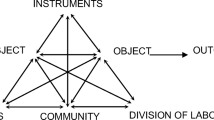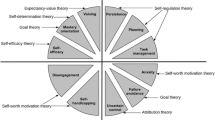Abstract
The purpose of this paper is to contribute to the debate about how to tackle the issue of ‘the teacher in the teaching/learning process’, and to propose a methodology for analysing the teacher’s activity in the classroom, based on concepts used in the fields of the didactics of mathematics as well as in cognitive ergonomics. This methodology studies the mathematical activity the teacher organises for students during classroom sessions and the way he manages1 the relationship between students and mathematical tasks in two approaches: a didactical one [Robert, A., Recherches en Didactique des Mathématiques 21(1/2), 2001, 7–56] and a psychological one [Rogalski, J., Recherches en Didactique des Mathématiques 23(3), 2003, 343–388]. Articulating the two perspectives permits a twofold analysis of the classroom session dynamics: the “cognitive route” students are engaged in—through teacher’s decisions—and the mediation of the teacher for controlling students’ involvement in the process of acquiring the mathematical concepts being taught. The authors present an example of this cross-analysis of mathematics teachers’ activity, based on the observation of a lesson composed of exercises given to 10th grade students in a French ‘ordinary’ classroom. Each author made an analysis from her viewpoint, the results are confronted and two types of inferences are made: one on potential students’ learning and another on the freedom of action the teacher may have to modify his activity. The paper also places this study in the context of previous contributions made by others in the same field.
Similar content being viewed by others
References
Arsac, G., Balacheff, N. and Mante, M.: 1992, ‘Teacher’s role and reproducibility of didactical situations’, Educational Studies in Mathematics23, 5–29.
Brousseau, G.: 1996, ‘L’enseignant dans la théorie des situations didactiques’, in R. Noirfalise and M.-J. Perrin-Glorian (eds.), Actes de la 8ème école d’été de didactique des mathématiques, IREM de Clermont–Ferrand, pp. 3–16.
Brousseau, G.: 1997, Theory of didactical situations in mathematics: Didactique des mathématiques 1970–1990, (trans.) N. Balacheff, M. Cooper, R. Sutherland and V. Warfield (eds.), Kluwer Academic Publishers, Dordrecht.
Brousseau, G.: 1998, Théorie des situations didactiques, Grenoble: La Pensée Sauvage.
Chevallard, Y.: 1999, ‘L’analyse des pratiques enseignantes en théorie anthropologique du didactique’, Recherches en Didactique des Mathématiques 19(2), 221–265.
Cobb, P. and Whitenack, J.W.: 1996, ‘A method for conducting longitudinal analysis of classroom videorecordings and transcripts’, Educational Studies in Mathematics 30, 213–228.
Comiti, C. and Grenier, D.: 1997, ‘Régulations didactiques et changements de contrat’, Recherches en Didactique des Mathématiques 17(3), 81–102.
Coulange, L.: 2001, ‘Enseigner les systèmes d’équation en Troisième. Une étude écono-mique et écologique’, Recherches en Didactique des Mathématiques 21(3), 305–353.
Even, R. and Schwarz, B.B.: 2003, ‘Implications of competing interpretations of practice for research and theory in mathematics education’, Educational Studies in Mathematics 54, 283–313.
Hache, C.: 2001, ‘L’univers mathématique proposé par le professeur en classe’, Recherches en Didactique des Mathématiques 21(1.2), 81–98.
Hache, C. and Robert, A.: 1997, ‘Un essai d’analyse de pratiques effectives en classe de seconde, ou comment un enseignant fait fréquenter les mathématiques à ses élèves pendant la classe’, Recherches en Didactique des Mathématiques 17(3), 103–150.
Hersant, M.: 2001, Interactions didactiques et pratiques d’enseignement – le cas de la proportionnalité au collège, Thèse de doctorat, Université Paris7.
Jaworski, B.: 1998, ‘Mathematics teacher research: Process, practice and the development of teaching’, Journal of Mathematics Teacher Education 1, 3–31.
Jaworski, B.: 2003, ‘Research practice into influencing mathematics teaching and learning development: Towards a theoretical framework based on co-learning partnerships’, Educational Studies in Mathematics 54, 283–313.
Krummheuer, G.: 1988, ‘Structures microscopiques des situations d’enseignement des mathématiques’, in C. Laborde (ed.), Actes du premier colloque franco-allemand de didactique des mathématiques, La Pensée Sauvage, Grenoble, pp. 41–51.
Krummheuer, G.: 2000, ‘Interpretative classroom research in primary mathematics education. Some preliminary remarks’, Zentralblatt für Didaktik der Mathematik 5, 124–125.
Leontiev, A.N.: 1975, Activité, conscience, personnalité, Moscou: Edition du progrès.
Leplat, J.: 1997, ‘Regards sur l’activité en situation de travail, Paris: PUF.
Margolinas, C.: 2002, ‘Situations, milieux, connaissances’, in J.-L. Dorier, M. Artaud, M. Artigue, R. Berthelot and R. Floris (eds.), Actes de la 11e école d’été de didactique des mathématiques, La Pensée Sauvage, Grenoble, pp. 141–155.
Maurice, J.-J. and Allègre, E.: 2002, ‘Invariance temporelle des pratiques enseignantes: Le temps donné aux élèves pour chercher’, Revue Française de Pédagogie 138, 115–124.
McCarthy, M.: 1997, Discourse analysis for language teachers, Cambridge University Press, Cambridge.
Mercier, A.: 1998, ‘La participation des élèves à l’enseignement’, Recherches en Didactique des Mathématiques 18(3), 279–310.
Perrin-Glorian, M.-J.: 1999, ‘Problèmes d’articulation de cadres théoriques: l’exemple du concept de milieu’, Recherches en Didactique des Mathématiques 19(3), 279–322.
Piaget, J.: 1962/2000, ‘Commentaries on Vygotsky’s criticisms of “Language and thought of the child”, and “Judgement and reasoning in the child’”, New Ideas in Psychology 18, 241–259.
Robert, A.: 2001, ‘Recherches sur les pratiques des enseignants de mathématiques du secondaire: imbrication du point de vue de l’apprentissage des élèves et du point de vue de l’exercice du métier d’enseignant’, Recherches en Didactique des Mathématiques 21(1/2), 7–56.
Robert, A.: 2003 ‘Tâches mathématiques et activités des élèves: une discussion sur le jeu des adaptations introduites au démarrage des exercices cherchés en classe’, Petit x 62, 61–71.
Robert, A. and Rogalski, J.: 2002a, ‘Le système complexe et cohérent des pratiques des enseignants de mathématiques: une double approche’, Canadian Journal of Science, Mathematics and Technology Education (La Revue Canadienne de l’Enseignement des Sciences des Mathématiques et des Technologies) 2(4), 505–528.
Robert, A. and Rogalski, M.: 2002b, ‘Comment peuvent varier les activités mathématiques des élèves sur des exercices. Le double travail de l’enseignant sur les énoncés et sur la gestion en classe’, Petit x 60, 6–25.
Robert, A. and Vandebrouck, F.: 2003, ‘Recherches sur l’utilisation du tableau par des enseignants de mathématiques de seconde pendant des séances d’exercices’, Recherches en Didactique des Mathématiques 23(3), 389–424.
Roditi, é.: 2003, ‘Régularité et variabilité des pratiques ordinaires d’enseignement. Le cas de la multiplication des nombres décimaux en sixième’, Recherches en Didactique des Mathématiques 23(2), 183–216.
Rogalski, J.: 2003, ‘Y a-t-il un pilote dans la classe ? Une analyse de l’activité de l’enseignant comme gestion d’un environnement dynamique ouvert’, Recherches en Didactique des Mathématiques 23(3), 343–388.
Schoenfeld, A.: 1998, Toward a Theory of Teaching-In-Context, http://www.berkeley.edu/faculty/aschoenfeld/TeachInContext/tic.html.
Schourup, L.: 1999, ‘Discourse markers: Tutorial overview’, Lingua 107, 640–667.
Sinclair, J.McH. and Coulthard, R.M.: 1975, Towards an Analysis of Discourse, Oxford University Press, Oxford.
Steinbring, H.: 1997, ‘Epistemological investigation of classroom interaction in elementary mathematics teaching’, Educational Studies in Mathematics 32, 49–92.
Steinbring, H.: 2000, ‘Interaction analysis of mathematical communication in primary teaching: The epistemological perspective’, Zentralblatt für Didaktik der Mathematik 5, 138–148.
Steinbring, H., Bartolini Bussi, M.G. and Sierpinska, A. (eds.): 1998, Language and Communication in the Mathematics Classroom, National Council of Teachers of Mathematics, Reston, VA.
Vannier-Benmostapha, M.-P.M.: 2002, Dimensions sensibles des situations de tutelle et travail de l’enseignant de mathématiques. étude de cas dans trois institutions scolaires, en CLIPA, 4ème technologique agricole et CM2, Thèse de Sciences de l’éducation, Université Paris5.
Voigt, J.: 1985, ‘Patterns and routines in classroom interaction’, Recherches en Didactique des Mathématiques 6, 69–118.
Vygotsky, L.: 1962, Thought and Language, MIT Press, Cambridge, U.S.A.
Vygotsky, L.: 1985, Pensée et Langage, Editions Sociales, Paris.
Wood, 1996: ‘Events in learning mathematics: Insights from research in classroom’, Educational Studies in Mathematics30, 85–105.
Wood, D., Bruner, J.S. and Ross, G.: 1976, ‘The role of tutoring in problem solving’, Journal of Child Psycholology and Psychiatry 17, 89–100.
Zaragosa, S.: 2000, Interactions verbales dans le processus de dévolution, Thèse de doctorat d’Université, Sciences de l’Education, Paris5.
Author information
Authors and Affiliations
Corresponding author
Rights and permissions
About this article
Cite this article
Robert, A., Rogalski, J. A Cross-Analysis of the Mathematics Teacher’s Activity. An Example in a French 10th-Grade Class. Educ Stud Math 59, 269–298 (2005). https://doi.org/10.1007/s10649-005-5890-6
Issue Date:
DOI: https://doi.org/10.1007/s10649-005-5890-6




